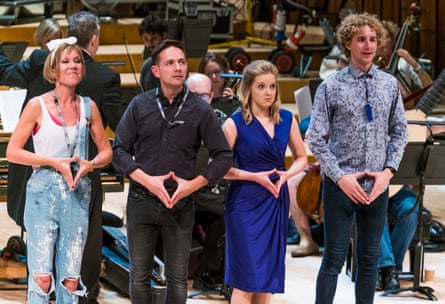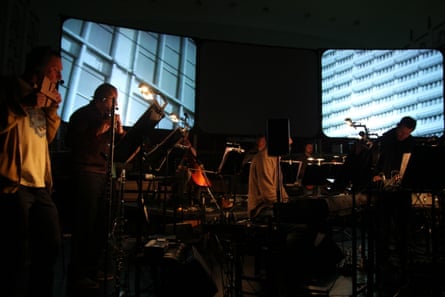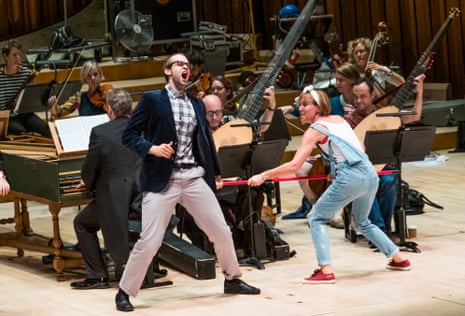Poor Purcell. Blessed Purcell. Poor audience. Lucky audience. The Fairy Queen (1692), a semi-opera with spoken text, was semi-staged by the Academy of Ancient Music at the Barbican on Monday. It was a semi-success. Half a sixpence, half a dud. The more important element, the music, beguiled and charmed, brilliantly played by the AAM with a strong cast and fiery, lively direction from the keyboard by Richard Egarr.
With singers of the class of countertenor Iestyn Davies, soprano Mhairi Lawson, tenor Charles Daniels and bass Ashley Riches, Timothy West as narrator, magical choruses (Hush, no more), arias (Hark! The Echoing Air) and Purcell’s instrumental interludes – overtures, symphony, chaconne – the harvest was potentially rich. Two young artists, soprano Rowan Pierce and tenor Gwilym Bowen, caught the ear: names to watch. So far, so good.
Semi-opera was a short-lived English form, a fantastical all-in-one of song, music and dance that must have delighted Restoration audiences after the no-fun years of the Commonwealth and before Handel and Italian opera came along. (That precis should not be subjected to too much scrutiny.) The Fairy Queen, nothing to do with Spenser and only marginally to do with Shakespeare, is loosely a version of A Midsummer Night’s Dream – so loose that none of the text is used, the characters are scarcely recognisable and the narration freely plunders other Shakespeare plays. Spectacle and music, it seems, redeemed all.
Whether this means we should indulge the chaos of this Barbican staging depends on taste. There was plenty of audience laughter as stage director Daisy Evans, the bright light behind Silent Opera, turned the formality of Purcell’s five masques into rehearsal-room muddle: people wearing head mics or hard hats, learning their lines, standing on step ladders, bumping into costume trolleys, sweeping or mopping the floor, and a host of other visual cliches (including paper-flapping birds which were then noisily torn into snow, an unfair fight with the music). There was much cod fiddling and twitching and eyebrow-raising and general emoting. In the end it was best not to look. Only Iestyn Davies – his voice made for Purcell but with little to do in this work – and, naturally, Timothy West could cope with the acting required. Any vestige of the story was lost. Dare I say surtitles would have helped? Providing the text in the programme is helpful, but few of us can read in the dark. This is the first in the AAM’s three-year series of Purcell semi-stagings. The superb ensemble is back, at the Barbican’s Milton Court, with Purcell and Bach and no staging, directed by the tenor James Gilchrist, on 20 October.

Gilchrist, an ever versatile musician, joined his regular recital partner, the pianist Anna Tilbrook, in her festival at St John’s Smith Square, Vaughan Williams and Friends. Composers included that British circle seen as rear-garde “pastoralists”, long shunned as unfashionable and now allowable once more: Parry, Howells, Bantock, Quilter, Gurney, Finzi. Rebecca Clarke (1886-1979) featured too, with the mighty Elgar an equal, rather than dominating, presence. All were born Victorians, all saw their way of life shattered by the advent of the first world war. The concerts, combining song and chamber music, were perceptively themed according to travel, the folk connection, the spiritual realm and the shadow of war.
Bliss’s little-known Elegiac Sonnet for piano, string quartet and voice sets words by Cecil Day-Lewis, instruments mirroring the “pure cascades and diamond plumes” of a fountain that plays no more. That melancholy thread continued through a group of six songs from Housman’s A Shropshire Lad in the poignant settings of George Butterworth, killed in France in August 1916. Gilchrist articulated words and emotion with unfussy, powerful directness. Tilbrook gave lovely free rein to those moments when the piano part spins into its own, buoyant mood. She was joined by Ellie Fagg, Tom Norris (violins), Martin Saving (viola) and Louisa Tuck (cello) for an assured account of Elgar’s late, glorious Piano Quintet, Op 84.
Having started with Purcell, I will also – almost – end with him. The pioneering ensemble Icebreaker, formed by composer James Poke in 1989, uses electronics, invented and standard instruments – flutes, panpipes, clarinets, vibes, electric violin, cello – to push and pull at the barriers of contemporary classical and rock. They attracted a dedicated audience to the Barbican’s Milton Court on Tuesday. After two noisy, rampant arrangements of pieces by Anna Meredith (b1978), they played Beat the Retreat (arr Poke) by one of their long-standing collaborators, Steve Martland (1954-2013). This spiky two fingers up to the criminal justice system borrows a bassline from Purcell and was written, in 1995, to commemorate the 300th anniversary of his death. Here it acquired new weight and brash colour, even if some of its winning clarity got lost in the process. The clash of revolution and tradition in this score is typical of Martland, a composer who died too young and left an indelible mark.

In this eclectic programme, BJ Cole was there to play pedal steel guitar in an explosive world premiere reworking (by Audrey Riley) of Scott Walker’s Epizootics, using the pop icon turned experimentalist’s original vocals. One of Icebreaker’s preoccupations is putting digital, studio-created music into a live context: giving robotics a human face. In the second half they revised their 2014 Arts Council tour event, Kraftwerk: Uncovered, playing the group’s tracks with monochrome film evoking glum 1970s industrial Germany and ending with that knuckle-whitening classic, Autobahn. From The Fairy Queen to Krautrock via Butterworth? It was just that kind of a week.
A footnote on Tristan und Isolde, reviewed a fortnight ago from the New York Met and starring Stuart Skelton and Nina Stemme: this week I had a chance to see it again, this time via the Met’s Live in HD cinema series. The difference in focus and detail, witnessed through a camera lens, was enormous. Many of the directorial problems fell away, the intensity and power of the singing left to work alone. These live streaming events add another strand to the operatic experience. They are invaluable. The next one is Mozart’s Don Giovanni, with Simon Keenlyside in the title role, on 22 October. And don’t forget Così fan tutte live from Covent Garden on 17 October.
Star ratings (out of 5)
The Fairy Queen ★★★
Vaughan Williams and Friends ★★★★
Icebreaker ★★★★

Comments (…)
Sign in or create your Guardian account to join the discussion